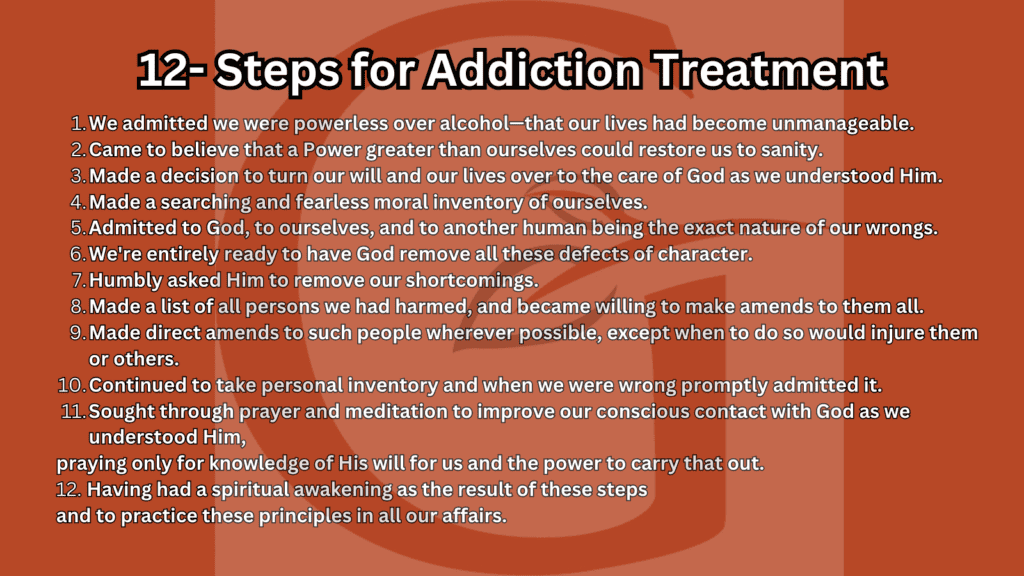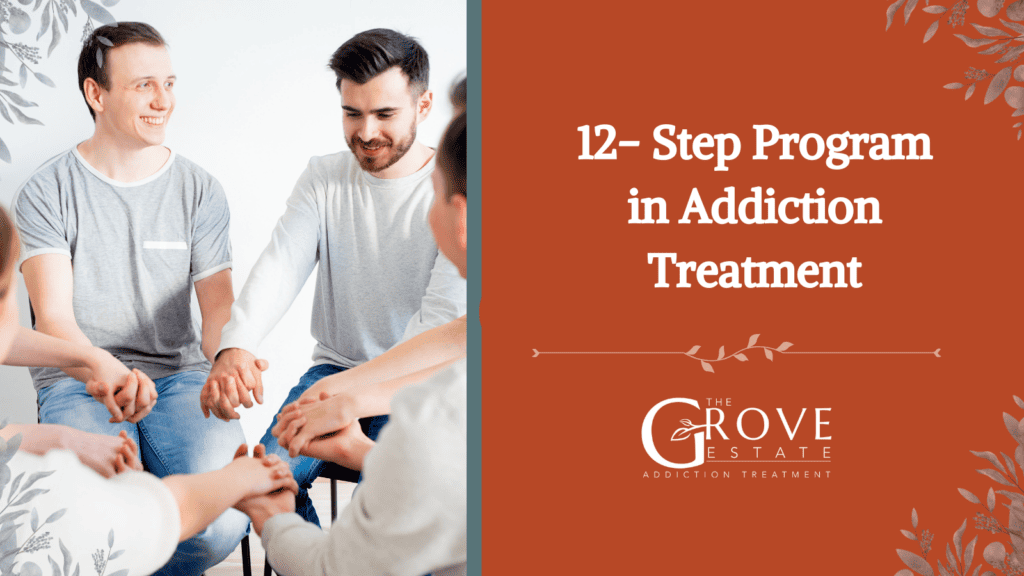Addiction is a complex condition, often requiring a personalized approach to treatment and recovery. It is not a one-size-fits-all issue; the path to sobriety varies significantly from person to person, influenced by individual circumstances, the nature of the addiction, and underlying personal and psychological factors. Among the various forms of addiction treatment, the 12-Step program stands out as a distinctive and widely recognized path to recovery.
Originating with Alcoholics Anonymous, the 12-Step program is a spiritual, yet non-denominational, framework that guides individuals through a process of self-examination, acceptance, and personal growth. This program has been adapted to address various forms of addiction and is central to many support groups and treatment modalities. Its focus on community support, personal accountability, and spiritual awakening has made it a proven path to sobriety for many individuals struggling with addiction.

What is the 12-Step Program?
Fundamentally, the 12-step program is a blend of spiritual journey and practical steps, guiding individuals through a transformative process. This involves admitting the severity of their addiction, seeking strength beyond themselves, and striving to repair the damages caused by their behavior. While the program has spiritual undertones, it emphasizes a broader sense of spirituality rather than adherence to a specific religious doctrine.
A key feature of the 12-Step program is its focus on community and peer support. Participants engage in regular group meetings, sharing experiences and offering mutual support, which is pivotal in reducing the sense of isolation often faced in recovery. Additionally, the program encourages ongoing personal growth and helping others in their recovery journey. This ethos of service and communal support underpins the effectiveness of the 12-Step program, making it a respected and widely adopted approach in the realm of addiction recovery.
What Is The History of the 12-Steps?
The 12-Step program, initiated by Alcoholics Anonymous (AA) in the 1930s, has a significant history in aiding individuals with addiction recovery. Founded by Bill Wilson and Dr. Bob Smith, the program revolutionized addiction treatment with its emphasis on personal accountability and mutual support.
Its success with alcoholism recovery led to the adaptation of the 12-Step principles to various other addictions, giving rise to numerous specialized programs. These include Narcotics Anonymous (NA) for drug addiction, Gamblers Anonymous (GA) for gambling addiction, Overeaters Anonymous (OA) for eating disorders, and Sex Addicts Anonymous (SAA) for sexual addiction, among others.
Each of these programs tailors the 12-Step principles to the specific nature of the addiction they address, maintaining the core emphasis on peer support and personal transformation. The widespread adoption and adaptation of the 12-Step model underscore its enduring impact and success in the realm of addiction recovery.

What are the 12- Steps for Addiction Treatment?
The 12 Steps as outlined in the “Big Book” of Alcoholics Anonymous, which is the foundational text for the 12-Step program for addiction treatment, are as follows:
- We admitted we were powerless over alcohol—that our lives had become unmanageable.
- Came to believe that a Power greater than ourselves could restore us to sanity.
- Made a decision to turn our will and our lives over to the care of God as we understood Him.
- Made a searching and fearless moral inventory of ourselves.
- Admitted to God, to ourselves, and to another human being the exact nature of our wrongs.
- We’re entirely ready to have God remove all these defects of character.
- Humbly asked Him to remove our shortcomings.
- Made a list of all persons we had harmed, and became willing to make amends to them all.
- Made direct amends to such people wherever possible, except when to do so would injure them or others.
- Continued to take personal inventory and when we were wrong promptly admitted it.
- Sought through prayer and meditation to improve our conscious contact with God as we understood Him, praying only for knowledge of His will for us and the power to carry that out.
- Having had a spiritual awakening as the result of these steps, we tried to carry this message to alcoholics, and to practice these principles in all our affairs.
These steps, initially designed for alcohol addiction, have now been adapted for various other types of addiction and form the core of many recovery programs. They combine self-examination, acknowledgment of a higher power, restitution for past wrongs, and a commitment to helping others with similar struggles.
Who Would Benefit from a 12-Step Program?
Individuals struggling with addiction, whether related to alcohol, drugs, or other compulsive behaviors, often find significant benefits in a 12-step program. This program is particularly suited to those who have recognized and acknowledged their struggles with substance abuse or addictive behaviors. It offers a well-defined framework for understanding and addressing addiction, providing clear steps to follow on the path to recovery. The structure and guidance of the 12-step approach can be especially advantageous for individuals who are beginning their journey toward sobriety and need a roadmap to help navigate this challenging process.
An essential aspect of the 12-step program is its focus on building a supportive community. Regular meetings and the sharing of experiences in a group setting offer invaluable support and motivation. This communal environment fosters a sense of belonging and understanding, which is often crucial for those in recovery. People who find strength in solidarity with others facing similar challenges will likely find the 12-step program’s emphasis on peer support and group interaction particularly helpful. This aspect of the program not only aids in overcoming addiction but also in maintaining long-term sobriety and personal growth.
What Can I Expect During a 12-Step Program?
Participating in a 12-step program involves a series of experiences and activities focused on recovery from addiction. Here’s what you can generally expect:
- Regular Meetings: You’ll attend regular group meetings, which are the cornerstone of the 12-step program. These meetings are usually peer-led and provide a platform for sharing experiences, strengths, and hopes with others in recovery.
- Working Through the Steps: The program involves progressively working through the 12 steps, which typically starts with admitting powerlessness over the addiction and progresses towards personal growth, making amends, and helping others.
- Sponsorship: Often, new members are encouraged to partner with a sponsor. Sponsors are individuals who have experience in the program and are in recovery themselves. They provide guidance, support, and encouragement as you navigate the steps.
- Self-Reflection and Personal Inventory: A significant part of the program involves introspection, where you’ll engage in self-examination to understand the impact of addiction on your life and the lives of others.
- Making Amends: The program guides you to make amends with those harmed by your addiction, which is an integral part of the healing and recovery process.
- Spiritual Aspect: The 12-Step program includes a spiritual component, encouraging you to explore a higher power as you understand it. This is not necessarily religious and can be adapted to fit personal beliefs.
- Continual Growth and Service: The later steps focus on continued personal growth and helping others in their recovery journey. This could involve sharing your story with new members or becoming a sponsor yourself.
- Privacy and Anonymity: Meetings and your participation in the program are confidential, respecting your privacy and that of others.
Each 12-step program may have its nuances, but they all share these core elements. It’s a journey of personal growth, healing, and community support, helping individuals build a foundation for long-term recovery.

What is the role of a peer support sponsor in a 12-step program?
A peer support sponsor in a 12-step program guides newcomers through the steps, offers emotional support, shares personal recovery experiences, and provides accountability and encouragement on the path to sobriety.
Peer support sponsors play a crucial role in the recovery process for several reasons, offering unique benefits that complement professional treatment methods. Here are the key reasons why peer support is important in recovery:
- Shared Experience: Individuals in recovery often feel isolated and misunderstood. Peer support brings together people with shared experiences of addiction and recovery, fostering a sense of belonging and understanding that can be deeply validating.
- Hope and Inspiration: Seeing others who have successfully navigated the path to recovery provides tangible hope and inspiration. Peer supporters serve as living proof that recovery is possible, motivating others to persist in their journey.
- Emotional Support: Peer support provides a safe space to express feelings and challenges. The empathy and understanding from someone who has been through similar struggles can offer comfort and reduce feelings of loneliness and despair.
- Accountability: Peers can hold each other accountable in a compassionate and understanding way. This mutual accountability can strengthen resolve and commitment to recovery, encouraging individuals to stay on track with their goals.
- Practical Advice and Strategies: Those who have been through recovery can offer practical advice and coping strategies that have worked for them. This exchange of information can be invaluable for navigating the challenges of sobriety.
- Empowerment: Peer support emphasizes empowerment, encouraging individuals to take charge of their recovery and build self-efficacy. It helps people see themselves as capable of overcoming addiction and making positive changes in their lives.
- Community and Connection: Recovery can be a long and challenging journey, and peer support fosters a sense of community and connection. This social support network can be a lifeline during difficult times, providing encouragement and assistance.
- Reduced Stigma: Engaging with peers can help reduce the stigma associated with addiction and recovery. Sharing experiences openly and without judgment can foster a more compassionate and understanding view of addiction.
- Continuous Learning and Growth: Peer support is a dynamic process where individuals can continue to learn, grow, and develop new insights into themselves and their recovery process, enhancing their personal development and resilience.
- Extended Support Network: Peer support extends beyond formal treatment settings, offering ongoing support that can be accessed in the long term, which is crucial for maintaining sobriety and managing relapses.
Peer support and support groups in 12-step programs complement professional treatment by providing emotional, social, and practical support that is grounded in shared experience and mutual respect. It’s a vital component of a holistic approach to recovery, contributing significantly to long-term success and well-being.
How Does the 12-Step Program Work?
The 12-step program works by guiding individuals through a structured process of recovery from addiction. Its effectiveness is rooted in several key components:
- Acknowledgment of Addiction: The first step involves admitting powerlessness over the addiction, recognizing that it has made one’s life unmanageable. This admission is crucial for breaking denial and accepting the need for change.
- Belief in a Higher Power: Participants are encouraged to believe in a power greater than themselves, which can restore them to sanity. This step is not necessarily religious and can be interpreted according to personal beliefs.
- Self-Examination and Accountability: The program involves a thorough self-examination, where individuals take a ‘moral inventory’ of their shortcomings and the harms they have caused. This introspection helps in understanding the root causes and patterns of addictive behavior.
- Making Amends: Participants are guided to make direct amends to those they have harmed, unless doing so would cause further harm. This step is vital for repairing relationships and building a new foundation of integrity.
- Continuous Personal Development: The program encourages ongoing self-reflection and improvement. Participants regularly review their behaviors and admit wrongdoings, fostering continuous personal growth.
- Helping Others: The final step involves carrying the message of recovery to others and practicing the principles of the program in all aspects of life. This altruistic component reinforces the individual’s recovery and provides a sense of purpose and community.
- Community Support: Central to the program is the support from others who are also in recovery. Regular meetings offer a space to share experiences and challenges, providing mutual encouragement and understanding.
- Sponsorship: Newcomers are often paired with a sponsor — someone who has experience in the program and is in recovery. The sponsor offers guidance, support, and accountability.
What Is the Effectiveness of 12-Step Programs for Addiction Treatment?
The effectiveness of 12-step programs in treating addiction has been substantiated through extensive research and practical observations, although experiences can vary among individuals. One of the most significant aspects contributing to their effectiveness is the provision of peer support. The 12-Step model creates a community of individuals who share similar experiences and struggles with addiction. This environment fosters a sense of belonging and understanding, providing an invaluable support network. Mutual encouragement and empathy within these groups play a crucial role in sustaining long-term recovery and preventing relapse.
Another key element of 12-step programs is their structured approach and emphasis on personal accountability. The program’s step-by-step process offers participants a clear and systematic path toward recovery. This structure, combined with the accountability that comes from regular group meetings and interactions with sponsors, helps individuals maintain their focus and commitment to sobriety. Furthermore, the holistic approach of the 12-Step program, which addresses not just the physical but also the emotional, spiritual, and social aspects of addiction, contributes significantly to its overall effectiveness. This comprehensive approach ensures that various facets of an individual’s life affected by addiction are acknowledged and addressed, aiding in a more rounded and sustainable recovery.
How Long Does the 12-step Treatment Program Take?
The duration of a 12-step treatment program can vary significantly from person to person, as it is not a one-size-fits-all approach and does not operate on a fixed timeline. The process is individualized and depends on several factors, including the nature and severity of the addiction, the individual’s personal circumstances, and their level of engagement with the program.
For some, working through the 12 steps could take several months, while for others, it might span over several years. It’s important to note that the 12-step program is often viewed as a lifelong commitment to personal growth and recovery, rather than a treatment with a definitive end date. The steps are not only about overcoming addiction but also about ongoing personal development and helping others in their recovery journey.

The remarkable success of the 12-step program can be attributed to its time-tested principles that emphasize not only abstinence but also personal growth, spiritual development, and the profound impact of peer support. Over the years, countless individuals have found solace, strength, and lasting recovery through these steps, proving that addiction can be overcome with the right tools and a community of like-minded individuals.
What Are different types of 12-step programs?
he 12-step program, originally developed by Alcoholics Anonymous (AA) in the 1930s, is a set of guiding principles outlining a course of action for recovery from addiction, compulsion, or other behavioral problems. The success of this model has led to the creation of numerous other programs adapted to address a wide range of issues. These programs typically follow the core structure of the 12 steps, with modifications to address the specific nature of each addiction or issue. Here are some of the different types of 12-step programs available:
- Alcoholics Anonymous (AA): The original 12-step program for people struggling with alcoholism. It emphasizes the powerlessness over alcohol and the need to turn one’s life over to a higher power.
- Narcotics Anonymous (NA): Similar to AA, but focused on individuals dealing with drug addiction, including both prescription and illegal drugs.
- Cocaine Anonymous (CA): Tailored for individuals recovering from cocaine addiction, incorporating the 12 steps to specifically address the challenges associated with cocaine use.
- Gamblers Anonymous (GA): For those dealing with compulsive gambling, offering support to stop gambling and address the issues related to it.
- Overeaters Anonymous (OA): Aims at individuals struggling with eating disorders or issues with food addiction, focusing on physical, emotional, and spiritual recovery.
- Sex Addicts Anonymous (SAA): Designed for people seeking recovery from sex addiction, offering a program to achieve sexual sobriety.
- Debtors Anonymous (DA): Provides a path for those dealing with compulsive debt and financial issues, focusing on solvency and responsible financial management.
- Al-Anon/Alateen: Offers support for family members and friends of alcoholics, helping them cope with the impacts of a loved one’s drinking.
- Nar-Anon: Similar to Al-Anon, but for the friends and family of those struggling with drug addiction, providing support and coping strategies.
- Emotions Anonymous (EA): For individuals seeking help with emotional difficulties, promoting emotional well-being through the 12 steps.
- Nicotine Anonymous (NicA): A program for those who are trying to quit smoking or using other forms of tobacco.
- Dual Recovery Anonymous (DRA): Aimed at individuals with a dual diagnosis of chemical dependency and an emotional or psychiatric illness, addressing both issues simultaneously.
Each of these programs adapts the foundational principles of the 12 steps to their specific focus, providing a structured approach to recovery that emphasizes personal accountability, mutual support, and the importance of a spiritual awakening (which can be interpreted according to personal belief systems). They offer a community of support that shares the common goal of overcoming addiction or compulsion and living a healthier, more fulfilling life.
What are the negative aspects of 12-step programs?
While 12-step programs have been instrumental in helping countless individuals achieve and maintain sobriety or recovery from various addictions, they are not without their criticisms or limitations. Here are some of the negative aspects or challenges associated with 12-step programs:
- One-Size-Fits-All Approach: Critics argue that the 12-step philosophy adopts a one-size-fits-all approach to recovery, which may not be suitable for everyone. Individuals’ experiences with addiction and recovery can vary greatly, and what works well for one person might not be effective for another.
- Spiritual Component: The emphasis on spirituality and the concept of a higher power in 12-step programs can be off-putting or irrelevant for atheists, agnostics, and those of different faiths. While the programs suggest that members can define their higher power in any way they choose, this aspect can still be a barrier for some.
- Anonymity Concerns: The principle of anonymity is fundamental to 12-step programs, designed to provide a safe and confidential environment. However, some individuals may still have concerns about privacy, especially in smaller communities where anonymity might be harder to maintain.
- Lack of Professional Oversight: Meetings are typically led by non-professionals who are themselves in recovery. While this peer-led approach fosters a strong sense of community and understanding, it also means there is a lack of professional therapeutic oversight, which might be necessary for dealing with complex issues related to addiction, co-occurring mental health disorders, or trauma.
- Dependence on Meetings: Some critics argue that 12-step programs can create a dependence on meetings and the program itself, which could potentially hinder personal growth and self-reliance in the long term.
- Perception of Powerlessness: The first step of the 12-step program involves admitting powerlessness over the addiction, which some critics argue could lead to a sense of victimhood or discourage personal agency and empowerment in overcoming addiction.
- Success Rates and Scientific Scrutiny: The effectiveness of 12-step programs has been a topic of debate. Some research suggests they can be very effective for many individuals, while other studies and critics question their success rates and lack of rigorous scientific evaluation due to the anonymity and voluntary nature of participation.
- Alternative Treatments: Critics also point out that reliance on 12-step programs might divert individuals from exploring other treatment options that could be more suitable for them, including medication-assisted treatment (MAT), cognitive-behavioral therapy (CBT), or other modern approaches to addiction recovery.
Despite these criticisms, it’s important to note that 12-step programs have been a crucial source of support for many people seeking recovery from addiction. The decision to participate in a 12-step program should be personal, and individuals are encouraged to explore various options to find what best suits their needs for recovery and support.
What are the therapeutic principles involved in the 12 steps that help to prevent relapse?
The 12 Steps promote healing through admitting powerlessness over addiction, recognizing a higher power, making amends, self-assessment, and continual personal improvement. Key principles include accountability, humility, acceptance, and spiritual growth, fostering recovery and personal transformation which all support relapse prevention.
How do drug and alcohol rehab centers incorporate the 12 steps?
Drug and alcohol rehab centers often incorporate the 12-step program principles into their treatment modalities to provide a comprehensive approach to addiction recovery. Here’s how they typically integrate these steps:
- Foundation of Therapy Sessions: Rehab centers may use the 12-step philosophy as a foundation for both group and individual therapy sessions. This approach allows participants to discuss and explore the steps in a supportive, therapeutic setting, guided by addiction counselors or therapists.
- Introduction to the 12 Steps: For many individuals in rehab, this might be their first exposure to the 12-step program. Facilities often introduce the steps early in treatment to help clients understand the program’s principles and how they can aid in recovery.
- Incorporation into Daily Activities: Rehab centers might integrate the principles of the 12 steps into daily activities and therapeutic exercises, helping clients apply these concepts to their recovery journey and everyday life.
- Facilitation of 12-Step Meetings: Many rehab centers host on-site 12-step meetings or facilitate access to external meetings. This provides a seamless transition for clients from the structured environment of rehab to the supportive community found in 12-step programs.
- Step Work: Clients are encouraged to work through the steps during their stay, often with the support of a sponsor or counselor who is familiar with the process. This work can help address the underlying issues of addiction and promote personal growth.
- Integration with Other Treatment Modalities: Rehab centers typically combine the 12-step approach with other evidence-based treatment modalities, such as Cognitive Behavioral Therapy (CBT), Motivational Interviewing (MI), and medication-assisted treatment (MAT), to address the complex nature of addiction.
- Aftercare Planning: Understanding and participating in 12-step programs during rehab can be crucial for aftercare planning. Many rehab centers recommend continued participation in 12-step meetings after discharge to support long-term recovery and provide a community of support.
By incorporating the 12-step program into their treatment offerings, rehab centers provide a multifaceted approach to addiction recovery. This not only addresses the physical aspects of addiction but also fosters emotional healing, spiritual growth, and personal development, which are essential for long-term sobriety.

Share This Post



